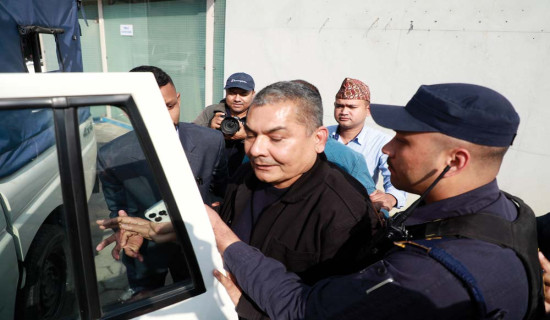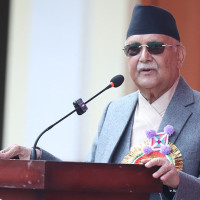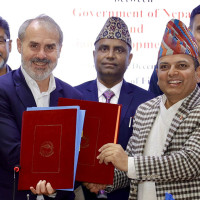- Thursday, 12 December 2024
Climate change biggest threat to planet: PM
By A Staff Reporter,Kathmandu, Sept. 28: Prime Minister KP Sharma Oli has prominently raised the issues related to climate change, international peace, multilateralism, and support for the Least Development Countries (LDCs) including Nepal in their graduation and development efforts at the 79th Session of the United Nations General Assembly (UNGA) being held in New York of the USA.
Delivering his speech as the Prime Minister of Nepal and leader of the Nepali delegation at the UNGA on Thursday, he said that the present world is far from being perfect.
Stating that none of the global challenges the world is facing today have been imposed by aliens but the creation of people that inhibited the earth, he called for the substantial reform of the global financial system as described by UN Secretary-General, Antonio Guterres as 'morally bankrupt'.
"We firmly believe that humankind is still capable enough to march ahead without compromising the prosperity and happiness of future generations. We firmly believe that stronger multilateralism, with the United Nations at its core, is the only path forward to tackle the numerous global crises we face," he said to the world leaders at the UNGA.
According to PM Oli, the voice and representation of countries in special situations including the LDCs, Landlocked Developing Countries (LLDCs), and Small Island Developing States (SIDS) must be ensured.
He stated that technology presented a double-edged sword, especially for the LDCs and called for technology transfer to enable them to catch up so that they could be saved from being left further behind.
Likewise, PM Oli said that climate change has emerged as the gravest threat to the planet, people and prosperity.
"My own country, Nepal, is particularly hard hit. We stand as one of the most vulnerable nations to climate change and are ranked as the 20th most disaster-prone country in the world. Of utmost concern is the alarming rate at which the pristine Himalayas, often referred to as the Third Pole, are losing their vast snow reserves," he said.
He told the world leaders that this loss threatens water availability for billions of people living downstream, extending far beyond the borders of Nepal.
Stating that despite efforts through forests, mountains and rivers, Nepal continues to bear the brunt of climate change, PM Oli called for climate justice.
As climate change is a global challenge, it demands global action and collaborative efforts to address its widespread and cascading impacts, according to him. "Adequate climate financing including ‘Loss and Damage’ fund is crucial to support climate-resilient measures and infrastructure for adaptation in developing countries not least in LDCs."
Prime Minister Oli expressed dismay over the world's distress caused by division, suspicion, hatred, and enmity.
"Nepal firmly believes that dialogue and diplomacy are the sole means to resolve conflicts, including in Ukraine and the Middle East. It is through love and compassion that hostility and hatred can be overcome, paving the way for lasting peace," he said.
Likewise, on the issue of the Israel-Palestine conflict, according to him, Nepal continue to support a two-state solution, where Israel and Palestine coexist peacefully and securely within internationally recognised borders, in line with relevant United Nations resolutions.
"We must address the worsening humanitarian crises in regions such as Libya, Syria, Sudan, South Sudan, Yemen, and elsewhere," PM Oli said. "It is vital to uphold the principles of sovereign equality, non-interference as enshrined in the UN Charter to ensure peace and stability. Consequently, we staunchly oppose any form of unilateral intervention or sanctions."
As the largest contributor of troops and police to UN Peace operations, Nepal stands ready to further enhance its contribution to global peace and security, he said while expressing Nepal's belief that it is the country's rightful call for having commensurate representation in the leadership positions, both at the UN headquarters and in the field, reflecting our significant contribution.
PM Oli said that protection of the rights of migrant workers including their safety, security, dignity, and wellbeing, has always remained Nepal's priority. "We strongly advocate for safe, orderly, and regular migration to ensure that the benefits of migration are shared by all," he said.
Meanwhile, talking about the conclusion of the peace process in the home country, he said that as a nation emerging from conflict, Nepal deeply understands the profound value of peace and political stability.
Since the signing of the Comprehensive Peace Accord in 2006, Nepal has been firmly focused on completing the peace process at the earliest, he said.
"Immediately after the formation of my government, parliament passed a Transitional Justice Bill to settle the transitional justice issue once and for all. While we implement the law, we will uphold victims’ rights, including truth and justice," he said.
According to him, the government in Nepal will also use reparations and reconciliation to heal the wounds and scars of the conflict period. "We appreciate the support from the international community including the UN system in this regard," he stated.















